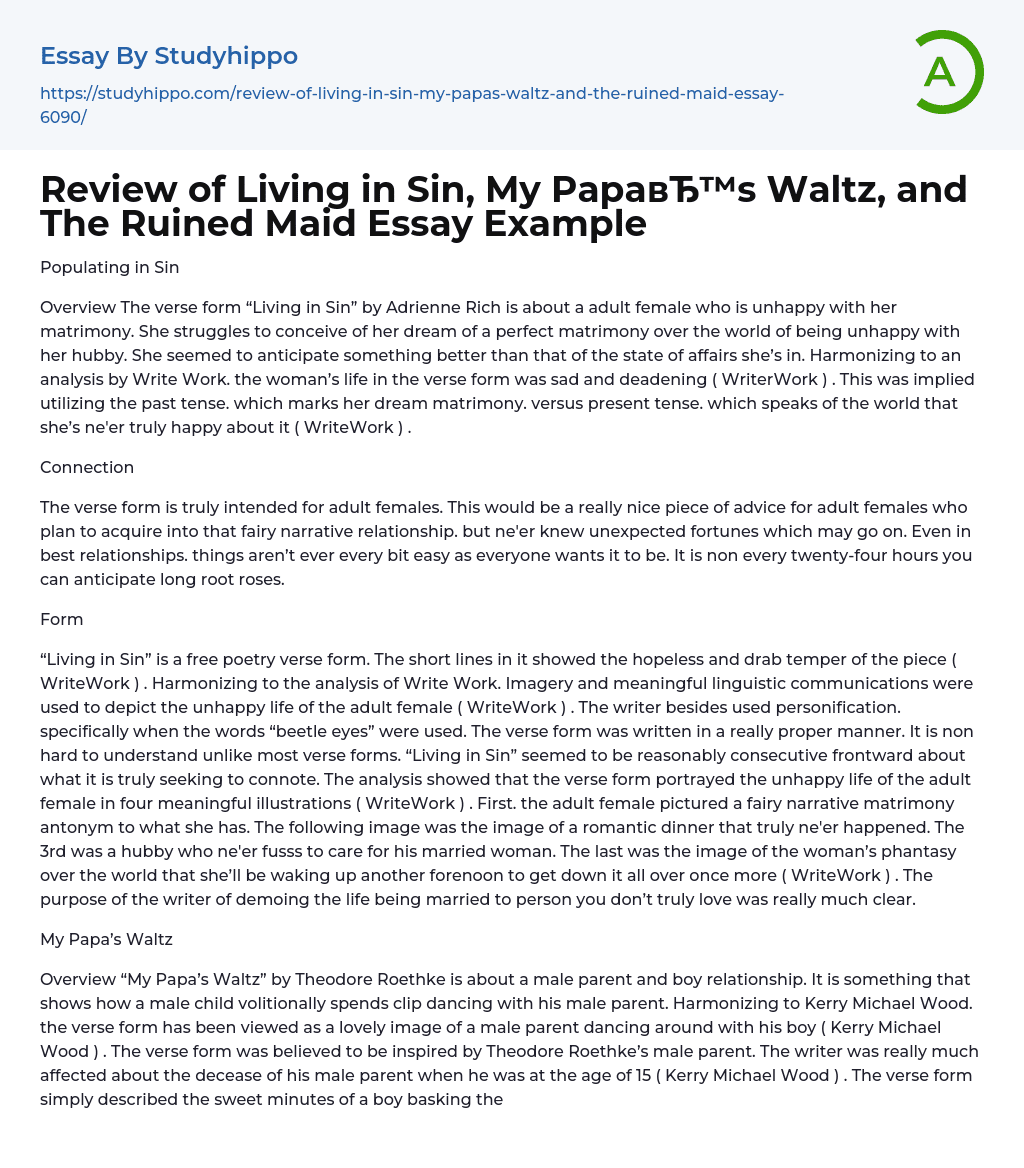

Review of Living in Sin, My Papa’s Waltz, and The Ruined Maid Essay Example
unified text with :
Populating in Sin Summary: The poem "Living in Sin" by Adrienne Rich depicts the unhappy life of a woman in her marriage. She yearns for an ideal marriage but is disenchanted with her current reality. The use of past tense signifies her desire for a better marriage, while present tense reflects her discontentment with the truth. The poem offers guidance to women who aspire to have fairytale relationships by emphasizing that unexpected challenges can arise even in the most perfect unions.
The poem is written in free verse, utilizing short lines to emphasize its somber mood. Imagery and poignant language are employed to portray the woman's unhappiness, including personification like referring to "beetle eyes". The poem exhibits a formal writing style and is relatively easy to comprehend compared to most poems.
'Living in Sin' appears fairly straightforw
...ard in conveying its true meaning. Upon analysis, it becomes evident that the poem illustrates the unhappy life of a woman through four significant depictions. Firstly, the woman envisions an idyllic marriage that starkly contrasts her actuality. Secondly, there is imagery of a romantic dinner that never materializes.
The third portrayal showcases a husband who neglects his wife's needs. Lastly, there is an image of the woman daydreaming about repeating the same monotonous routine each morning. The author's intention of illustrating married life without true love is clear.
Summary: "My Papa's Waltz" by Theodore Roethke is a poem that explores the relationship between a father and son. It depicts the son willingly spending time dancing with his father, evoking nostalgic memories. The poem serves as an inspiration for cherishing moments with parents and appreciating them. It follows a
iambic trimester rhythm and has a cheerful tone due to its ABAB rhyme scheme. The use of paradox and slant rhymes adds depth to the portrayal of awkwardness in the poem.
"The Ruined Maid" by Thomas Hardy portrays a conversation between two former coworkers who have taken different paths in life.In Liz Allen's analysis, the initial woman is taken aback by the unexpected appearance of her friend Amelia, whom she hadn't seen in a while. It becomes apparent that Amelia has become a prostitute, as she refers to herself as "ruined". Liz Allen's poem titled "The Ruined Maid" contrasts two women and delves into both their past and present lives. The poet had intended the poem for an adult audience and conveys the underlying message that appearances can be deceptive. Everyone experiences challenging times in their lives, and although Amelia may seem more well-off in terms of her clothing and accessories, deep down she is filled with apprehensions and regrets. The poem portrays Amelia as a symbol of transformation, but the means through which this transformation was achieved are questionable. "The Ruined Maid" can serve as a contemplation on society's treatment of women and the potential consequences associated with engaging in prostitution. The poem adopts a dialogue format comprising six stanzas, each consisting of four lines. In the first three lines, one woman speaks while Amelia responds in the fourth line. The name "Amelia" implies hard work and dedication, suggesting that she may have invested considerable effort into her occupation. On the other hand, the other woman abbreviates her name to "melia," which carries implications of competition or ambition; hinting at Amelia's aspirations to belong to
a higher social class.
The line "bright plumes three" contains an allusion, while the phrase 'being ruined' metaphorically suggests that she had become a prostitute. According to Allen's analysis, the writer uses various poetic devices when addressing Liz Allen in the first woman poem, such as phrases like 'digging potatoes' and 'spudding up docks', which emphasize initial rhyme. The poem follows a consistent AABB rhyme scheme with the third and fourth lines always rhyming. The three poems differ greatly in form, style, and approach. Adrienne Rich's "Living in Sin" portrays life being married to someone you don't truly love. It is written in free verse with a mundane tone. On the other hand, Theodore Roethke's "My Papa's Waltz" has a joyful tone and follows a regular rhyme scheme, creating a more cheerful mood. In contrast, Thomas Hardy's "The Ruined Maid" combines a melancholic tone with a structured rhyme scheme. While "Living in Sin" emphasizes the happiness women should experience in marriage, "My Papa's Waltz" highlights the importance of parents in children's lives. Meanwhile,"The Ruined Maid" offers deeper insight into women's rights in society. These poems convey messages that may not have one definitive interpretation for readers to understand clearly.
- Boo Radley essays
- Genesis essays
- Richard iii essays
- Alice in Wonderland essays
- On the road essays
- Ozymandias essays
- The Nightingale essays
- Holden Caulfield essays
- Animal Farm essays
- 1984 essays
- A Hanging essays
- Shooting An Elephant essays
- A Tale Of Two Cities essays
- Adventures Of Huckleberry Finn essays
- Arthur Conan Doyle essays
- Brave New World essays
- Characters In Hamlet essays
- Characters In Romeo And Juliet essays
- Desdemona essays
- Diary Of A Wimpy Kid essays
- First-Person Narrative essays
- Frankenstein essays
- Heart Of Darkness essays
- Jane Eyre essays
- Jay Gatsby essays
- King Duncan essays
- Librarian essays
- Little Red Riding Hood essays
- Lord Of The Flies essays
- Silas Marner essays
- The Cask Of Amontillado essays
- The Catcher In The Rye essays
- The Crucible essays
- The Handmaid's Tale essays
- The Reader essays
- Virgil essays
- Wuthering Heights essays
- Candide essays
- Castle essays
- J. D. Salinger essays
- Ulysses essays
- Ethan Frome essays
- In Cold Blood essays
- Outliers essays
- Tuesdays With Morrie essays
- The Art of War essays
- Wife of Bath essays
- Huckleberry Finn essays
- The Lady With The Dog essays
- Great Expectations essays



